#olga diary entry
Text
Maria Nikolaevna, the Lefty

"Of course, it's more difficult to for Maria Nikolaevna and Anastasia Nikolaevna to write, but all the same, give them my greeting and my impatient expectation from them, a letter, especially from Maria Nikolaevna, from whom I have not received a line yet, and meanwhile I am wondering whether it is true that she forgot me and does not want to write because she is not allowed to write with her left hand, and the right one refuses to write. Yes, and please tell Maria Nikolaevna what I saw five days ago in a dream: her right hand index finger and little finger were bandaged. After all, that's what the thoughts mean. In the afternoon I puzzle in my head, why she does not write, but in my dream I see the reason I did not think about, because I know from your letters that you are all, thank God, healthy." - Petr Vasilievich Petrov to Olga Nikolaevna, 1909.
#history#imperial russia#historical photos#romanovs#otma#olga nikolaevna#maria nikolaevna#anastasia nikolaevna#anastasia romanov#pvp#letter#letters/diary entries/quotes#left handedness#russian royalty
58 notes
·
View notes
Text

Grand Duchess Olga Nikolaevna with her friend and fellow Sister of Mercy (nurse) Margarita “Rita” Khitorovo, Evpatoria Crimea 1916
“Monday, 16th May.
“…In the afternoon went to Anya’s dacha . Rita was there too. Sat on a marvelous beach near the sea, hunted for seashells. Had tea on her balcony. Returned at 6 o’clock…”
— Diary of Grand Duchess Tatiana Nikolaevna
Bonus! Hand tinted version by one of OTMA
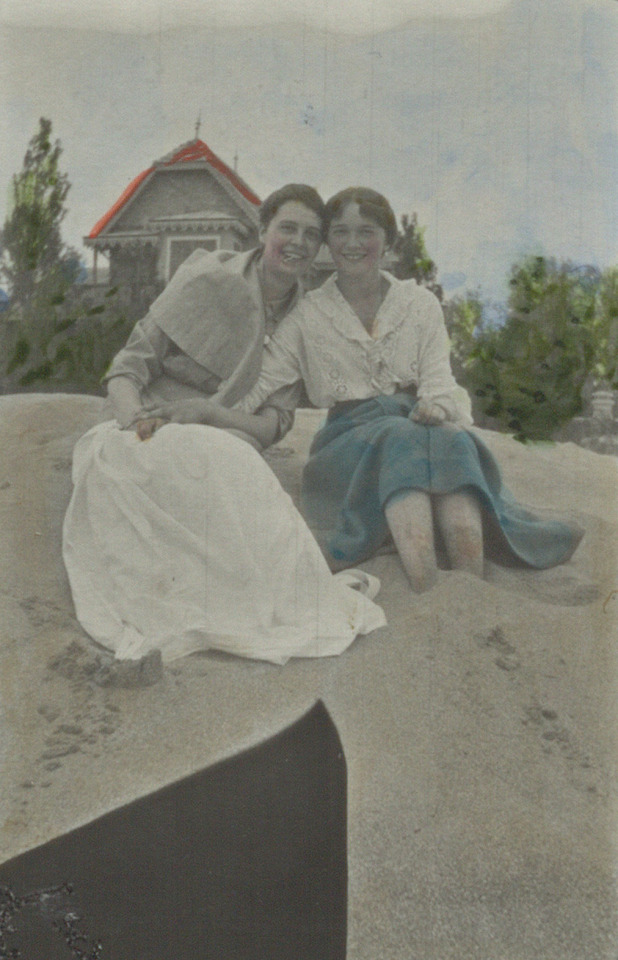
#olga nikolaevna#Margarita khitorovo#rita khitorovo#grand duchess olga#crimea#evpatoria#1916#tatiana nikolaevna#otma#romanov#1916 diary#diary entry
34 notes
·
View notes
Text
Olga Nikolaevna’s diary, 20th January/2nd February 1913
“At 10 1/2 went to obednya at the regimental church. There was a big breakfast and music. Sat with Baron Karf and Admiral Nilov at Papa’s table. Saw my friend AKSHV, greeted him and felt happy, but did not talk to him. At 2 o’cl. 7 min we 4 went to Petersburg with Olga Yevgenievna. Went to [see] Grandmama at Anichkov and then went with Aunt Olga to her [house]. At 4 o’cl. dear N.P., P.A. Voronov, S.S. Klyucharev, N.N. Rodionov, V.V. Kvoshinsky., A. Shangin – a cuirassier and N.A. Kulikovsky arrived. Aunt Olga was there. [We] had tea and then ran around, played and danced to the phonograph until 6 o’clock.
At 6 ½ [we] went to get dressed. Dinner was at 7 o’cl. 15 min. [I] sat with Shangin and N.P. Was so happy to see him, the dear one, and talk to him. It was sad not to see Mama for so long. She is still not feeling well, but is a little better. At 8 o’cl. 45 min Papa came to get us and we went to the Mariinsky Theater with him to see the ‘Don Quixote’ ballet. Pavlova danced wonderfully. Saw Prince Beloselsky from afar. Returned at 12 o’cl. Anya was sitting with Mama.”
3 notes
·
View notes
Text









Han Kang, Human Acts (trans. Deborah Smith) // Virginia Woolf, diary entry c. 1931 // Olga Bergholz, "Conversation With a Neighbour" // 墨香铜臭, Heaven Official's Blessing // Koyoharu Gotouge, Demon Slayer (edited by @tanchirou) // Haruki Murakami, IQ84 // Natalie Wee, "Never Been Kissed" // Euripides, Grief Lessons: Four Plays (trans. Anne Carson) // a.j., "weight"
#theme: endurance#theme: enduring#theme: willpower#web weaving#webs#aesthetic#art#poetry#prose#prose poetry#collage#literature#novels#novel quotes#book quotes#manga#demon slayer#rengoku#heaven official's blessing#tgcf#endurance#enduring#willpower#strength
689 notes
·
View notes
Text
Romanov myths part three - did the Grand Duchesses go shopping?
Over the years, a prevalent belief that the Romanov Grand Duchesses, Olga, Tatiana, Maria, and Anastasia did not go shopping continues to be repeated. Some historians have even suggested that the girls did not know how paying for items worked. However, primary sources from people who knew the girls, were members of their entourage, and the Grand Duchesses' own diaries, tell a different story...
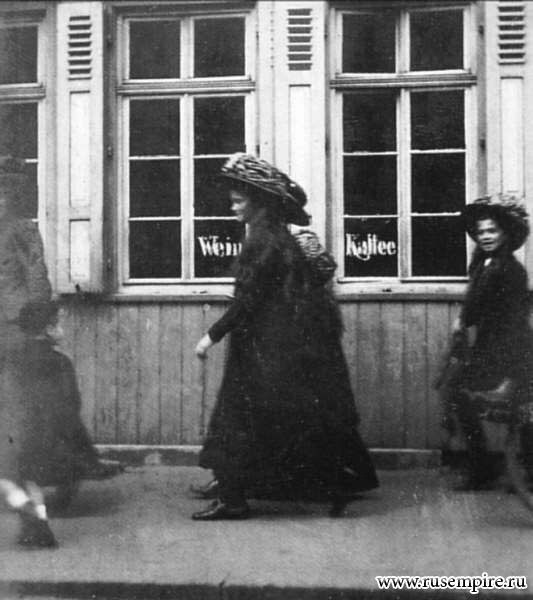
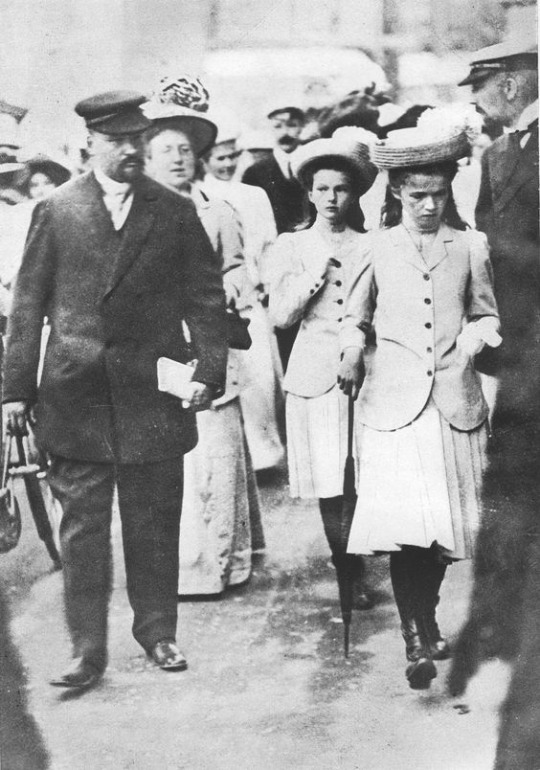
"Saturday. 10 August. … We walked along the historic boulevard and the main streets, but crowds followed us everywhere, so we were able to go into only 2 shops for a minute..."
"Friday. 15 November. Had lessons, after that went shopping for wool with Nastenka as usual.."
From Grand Duchess Olga Nikolaevna’s 1913 diary [my underlining]
In this entry, Olga describes shopping Countess Anastasia 'Nastenka' Vassilievna Hendrikova, who was a young lady-in-waiting at court and a particular favourite of the Grand Duchesses, often accompanying them on trips. As described in the first entry, it appears that safety and security concerns due to crowds, rather than a lack of understanding about shops, contributed to the Grand Duchesses not being able to shop frequently. Nastenka is frequently mentioned by the Grand Duchesses in their diaries, and volunteered to join the Romanov family in their house arrest and imprisonment. She was murdered by the Bolsheviks in September 1918.
"After coffee, I went for a walk with my pupils… They really liked to go to the shops and buy everything. Anastasia Nikolaevna was especially attracted to stores, where they sold doll shoes of various sizes… Tatiana Nikolaevna did not always accompany since the doctors found her heart was weak and she went with the Empress to take baths."
A Few Years Before the Catastrophe by Sofia Ivanovna Tyutcheva.
Sofia Ivanovna Tyutcheva was a maid-of-honour to Tsarina Alexandra Feodorovna, and in 1907 was appointed as governess to the Grand Duchesses. The Grand Duchesses referred to her as "Savanna". She was dismissed in 1912 when she voiced concerns over Grigori Efimovich Rasputin. She wrote a short memoir in 1945, and passed away in 1957.
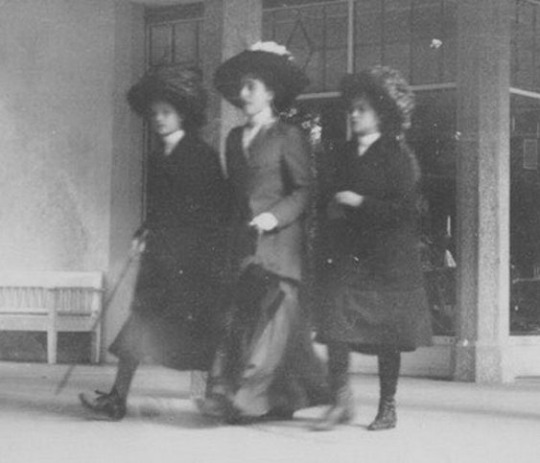
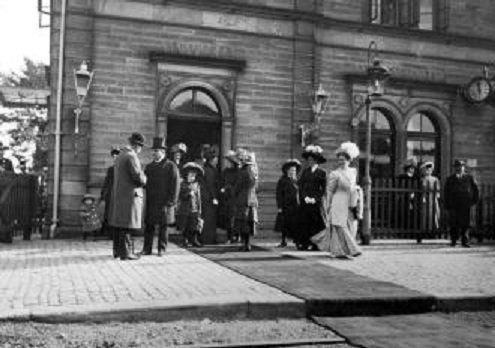
"[The] Grand Duchesses went shopping in the morning with one of the ladies-in-waiting to the Empress. They delighted in that because they could mix with the crowd and buy things just as everyone else did, and they were so pleased if they were not recognised at once." -- Upheaval - Olga Voronova
Countess Olga Konstantinovna Voronova was part of the aristocratic Kleinmichel family and in 1914, married one of the Romanov's favourite officers, Pavel Alexeievich Voronov. Through these connections, Olga Konstantinovna became a friend of the Grand Duchesses, exchanging frequent letters with Olga and Tatiana in particular, before and after the Revolution. She published her memoirs in 1932. Once again, it is inferred that being recognised and subsequent security concerns stifled the Grand Duchesses' shopping sprees.
Where did the myth come from?
It appears that the myth came about due to this extract from Margaretta Eagar, an Irish nanny who cared for the children from 1898 to 1904:
Her only knowledge of shops and shopping was derived from the toy and sweet shops in Darmstadt. One day she asked me why the Americans spoke English, not American. I told her the story of the Pilgrim Fathers, and described how they built houses and shops, and so made towns. She was exceedingly interested and inquired, ' Where did they find the toys to sell in the shops ? "
Six Years at the Russian Court, by Margaretta Eagar
It appears that some historians forgot that Margaretta Eagar moved on from her nanny position in 1904, when the eldest Grand Duchess was nine and the youngest was three, and perhaps did not look for sources from when the Grand Duchesses had grown up and had slightly more independence.
Over time, the myth appears to have been exaggerated and repeated until it became part of the 'folklore' surrounding the Romanov Grand Duchesses.
Whilst it is clear that the Grand Duchesses did enjoy going shopping in their lifetimes, safety and security concerns meant they could not enjoy shopping as frequently as other teenagers may have. In the same way royals today would not be able to go to shops without being recognised, there was a chance that a crowd could gather. Similarly, Olga and Tatiana appear to have shopped more than the younger pair, Maria and Anastasia, likely due to being older in age and therefore having more independence.
Photos:
First set, left: Olga, Anastasia (hidden behind Olga), and Maria Shopping in Germany, 1910. Right: Olga and Tatiana out shopping in the Isle of Wight, 1909, accompanied by Dr. Evgeny Botkin (in the suit)
Second set, left: Tatiana and Maria shopping with Sofia Ivanovna Tyutcheva, circa 1910. Right: The Grand Duchesses and their entourage by shops, most likely taken in Germany, 1910
Sources:
Journal of a Russian Grand Duchess: Complete Annotated 1913 Diary of Olga Romanov, Eldest Daughter of the Last Tsar, translator Helen Azar, (Independently published: 2015)
A Few Years Before the Catastrophe: The Memoirs of Sofia Ivanovna Tyutcheva, translator George Hawkins, (Independently published: 2020)
Upheaval, Olga Voronova (Woronoff), (New York; London: G. P. Putnam's Sons, 1932) -- Free to read online here
Six Years at the Russian Court, Margaretta Eagar, (New York: Charles L. Bowman and Company, 1906) -- Free to read online here
#Romanov#Romanov family#otma#Olga Nikolaevna#Tatiana Nikolaevna#Maria Nikolaevna#Anastasia Nikolaevna#sources#myths#myth-busting#Romanov sisters#Margaret Eagar#Margaretta Eagar#Sofia Ivanovna Tyutcheva#Nastenka Hendrikova#diaries#free to read#Olga Romanov#Tatiana Romanov#Maria Romanov#Anastasia Romanov
122 notes
·
View notes
Note
hi imane <3 i wanted to know if you have any recent book recommendations? i'm just looking for what you specifically, i don't really know where to start when it comes to the sci-fi genre. thank you!
hey angel!! for sci-fi I’m not the most avid reader even though I really like the genre so my recommendations are going to be the equivalent of the billboard top 100 lmao they aren’t the most hidden gems. If you’re into fast paced space operas the blighted stars by megan o’keefe was definitely the highlight of the month and it’s not super hard to understand (though it’s quite political). It reminded me of the expanse (the show, haven’t read the books yet). If you’re more into horror sci-fi I’d recommend annihilation by jeff vandermeer. cozier sci-fis that I really enjoyed were the murderbot diaries by Martha wells and the long way to a small angry planet by becky chambers. the employees by olga ravn was a strange and thought provoking lil book. the left hand of darkness and the word for world is forest by ursula le guin are classics for a reason, and can’t wait to read the disposed soon!! and finally if you really want an entry level fun read that’ll pass by the blink of an eye, skyward by brandon sanderson 🫶🏼
8 notes
·
View notes
Text

On the photograph from the left to right: the Grand Duchesses Olga Nikolaevna, Tatyana Nikolaevna, Maria Nikolaevna, and Anastasia Nikolaevna. On their right wrists the gold non-removable bracelets are visible. Livadia Palace, 1916
[...] 'However, even though the amount of jewellery on the four daughters was minimal there were some pieces present and are quite visible on each photograph. These pieces are: the gold non-removable bracelets, and three watches – worn by Olga Nikolaevna, Tatyana Nikolaevna, and Anastasia Nikolaevna. The gold non-removable bracelets were worn by the daughters on their right wrists. They are not only visible on the photographs of the Tsarskoe Selo period but also on earlier ones.
The information about the gold bracelets can be found in the diary of Alexandra Feodorovna dated 4 July 1918 (new style date): ‘and a bracelet per child which we had given them as presents.’ As per the same dairy entry, Alexandra Feodorovna herself had two similar bracelets: ‘they only left me the two bracelets from uncle Leo, which are non-removable’. ‘They’ in the last quote refers to the commandant of the Ipatievsky house, Yakov Mikhailovich Yurovsky (7 June 1878 - 2 August 1938), and his assistant Georgi Petrovich Nikulin (27 December 1894 – 22 September 1965).
In his notes, Yurovsky gives more details about the bracelets in question: ‘Alexandra Feodorovna, however, expressed her displeasure when I was going to remove a gold bracelet from her hand; it was locked and it was not possible to remove it without a special tool. She proclaimed that she had been wearing the bracelet for 20 years and now it was being attempted to be removed. Taking into consideration that similar bracelets were worn by her daughters and that they were not of particular value, I decided to leave them.’ (Notes by Yurovsky Y.M. P.109, 1934)' - Seraphima Bogomolova
Read more in Part One: 'Like Kings and Queens, Like Princes and Princesses'

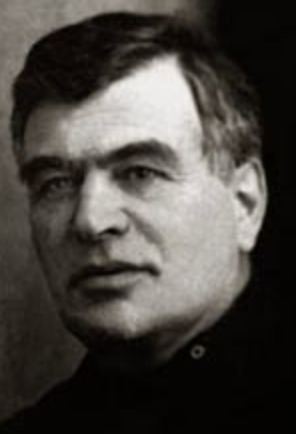
On the photographs: on the left - Georgi Petrovich Nikulin (27 December 1894 – 22 September 1965), the assistant to commandant of the Ipatievsky house; on the right - Yakov Mikhailovich Yurovsky (7 June 1878 - 2 August 1938), the commandant of the Ipatievsky house.
#Romanovs#Nicolas II#investigation#research#jewellery#Romanovs jewellery#Anastasia Nikolaevna#Maria Nikolaevna#Tatyana Nikolaevna#Olga Nikolaevna#gold bracelets#Yakov Mikhailovich Yurovsky#Georgi Petrovich Nikulin#watches#July 1918#summer 1917#seraphima bogomolova#murder mystery
7 notes
·
View notes
Note
Also a Russian article about Alexander and Olga Nikolaevna: (so that it would not be difficult for you, translation)
Speaking about the loves of Grand Duchess Olga Nikolaevna, it is impossible to ignore this one. Probably, it was a very short infatuation – maybe just a WILLINGNESS to fall in love – but it was this feeling that had every chance of getting continued. After all, Olga finally liked an equal in position: the prince of a foreign power.
In December 1913, Olga realized that her "sun" was Pavel Voronov (more?) he does not reciprocate her, and made several emotional entries about him in his diary, using a secret cipher. His behavior confuses and worries her, feelings are looking for a way out... on December 21, the denouement follows: "I found out that my S. is marrying Olga Kleinmichel. God send him happiness, my beloved S. It's hard. Sadly. He would be pleased." Olga also encrypted this entry. It would seem that the time has come to immerse yourself in experiences for a long time, but after a few weeks the mysterious cipher appears in the diary again. And if earlier he hid only declarations of love for Voronov, now Olga writes about something else (further encrypted fragments are italicized):
"January 12.
Alexander Serbian arrived (In Russian uniform. Wow, what eyes).
January 15th.
At 9:00, my Dad and Aunt and I went to St. Petersburg for the consecration of the new church of the Fedorovskaya Mother of God in honor of the 300th anniversary. It lasted from 10 to 1 ¼. Metropolitan, etc. A bright, large, good church. I was standing next to Alexander the Serbian, he was a little further away. Wow, wow what.
January 17th.
We had breakfast with Dad, Aunt, Kostya and Alexander. I sat with him. Cute, embarrassing and beautiful horror. Wow wow what.
January 19th.
Mom I don't know how. I fell asleep after 3 hours at night. God save her and everyone , and Alexander S.
January 23.
After in the Winter Courtyard. a big breakfast. Then we talked. I've been with Alexander for quite a long time. God save him.
The 25th of January.
We had breakfast with Papa, T. Olga, gr. Fredericks and Alexander S. He came to say goodbye. He's leaving in 2-3 days, it's a pity, dear."
Alexander Karageorgievich was 7 years older than Olga. He had a lot to do with Russia: he had Russian tutors, was the godson of Alexander III and the named son of Nicholas II; studied at the School of Jurisprudence and in the Page Corps in St. Petersburg. He became heir to the throne in 1909, after his elder brother George was forced to give up his rights to the throne under the pressure of a scandal.
In the same year, Alexander almost asked for the hand of Princess Tatiana Konstantinovna. The Serbian minister and even the father-king personally made a cautious reconnaissance on this matter. But to the Konstantinovichs, the position of the Karageorgievich dynasty on the throne seemed too shaky. K.R., Tatiana's father, wrote in his diary: "I told her in detail about the claims of the Serbian court and about the reasons prompting us to advise her to refuse this offer. Although she rather likes Sandro Serbian, she did not hesitate to give him up."
However, a year later the families still became related: Alexander's sister Elena married Grand Duke John Konstantinovich. For the Karageorgievichs, this was a great success, because they took the throne only in 1903 by a coup. In Europe, they were not really recognized, and not all Romanovs were disposed to them.
In 1912-13, Alexander managed to show valor in the Balkan wars. And then he thought about getting married again, but now he was interested in the daughter of the tsar himself. ONLY WHICH ONE?
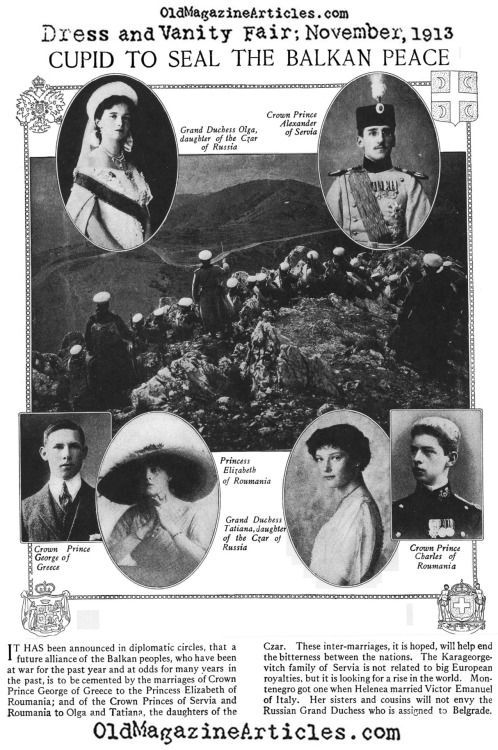
In this newspaper for November 1913, it was suggested that Olga would become the wife of Alexander of Serbia, and Tatiana – Karol of Romania. On the other hand, the English Wikipedia, with reference to Serbian archives, assures that Prime Minister Nikola Pasic wrote to Nicholas II in January 1914 about Alexander's intention to marry one of the Grand duchesses. Nikolai did not object and even noticed the interest that his daughter showed in the prince – but it was allegedly not Olga, but Tatiana. (And Russian Wikipedia generally assures: "Tatiana and Alexander wrote letters to each other until their death. When Alexander found out about Tatiana's murder, he was confused and almost committed suicide").Alexander's sister Elena, in her memoirs, which I have not yet been able to find, seemed to say that she noticed some "chemistry" between Alexander and Olga. Well, Olga's diary allows us to conclude that Alexander was not indifferent to her, and I think the Serbian heir himself paid attention to her. You can only guess what prevented you from taking the next step.In the spring, Olga is fond of Molokhovets, then the war begins, but all this does not prevent her from remembering Alexander on various occasions:"February 24.At 12 o'clock my mother received the Bavarian, Belgian, Danish and Serbian envoys (Nalajovic. So reminds Alexander C).February 25.(in small print: I haven't seen Alexander for a month since)March 25.I haven't seen Alexandra for 2 months. <...>(added, apparently, later) I haven 't seen Alexander S. for 2 months .September 4.The Pope gave Alexander of Serbia the St. George Cross 4 art . I am very happy. God help me.October 6.John, Gabriel and Kostya and Elena had lunch. They told me a lot of interesting things. She's a piece of Alexander, and I love her.October 16.At 7 o'clock we went to the infirmary with Mom, we went to everyone, and talked to K. and I. in the corridor. Everyone knows Alexander by his body."

Alexander was a thin brunette with a mustache and large facial features (and with "WOW" eyes) – this is exactly the type of appearance that has always attracted Olga. Besides, apparently, he was a really nice person. "The prince turned out to have a kind and friendly character," writes the grandson of his tutor, the famous priest Gleb Kaleda. "To please his tutor, the prince wrote to him in Russian, asking for forgiveness in advance for possible mistakes, although there were none." He was remembered as a tactful person, sometimes shy and prone to melancholy, a lover of reading – there is some similarity with Olga's character.Olga did not see Alexander again, but a year later she noted in her diary the anniversary of his arrival:"January 12, 1915.The year that I saw Alexander at Vsevolod's christening.January 15th.The year is consecrated. churches. Alexander.January 17th.Mordvinov and Count Fredericks were having breakfast. And a year ago Alexander. God bless him."It seems that even in the spring of 1916, Pasic expressed the hope that Olga would become the Serbian queen. But in January of this year, the date of the meeting with Alexander was not noted in the diary. At this time, Olga hardly thought about anyone other than Dmitry Shah-Bagov. (By the way, here her fate again intersects with the fate of Tatiana Konstantinovna, who was very friendly with the elder daughters of Nicholas II. Instead of the Serbian prince, she married a simple Caucasian officer for love, and he even served in the Erivan regiment – like Olga's lover. Because She even knew Shah Bagov and calls him a "cute, cute boy" in a letter. Surely Olga was thinking about what could repeat her path).But in 1917 Olga remembers again:"January 17th. Exactly 3 years ago today Alexander Serbsky had breakfast with us." Here the name is also written in cipher, and this is the last encrypted entry in the diary.
Olga Nikolaevna's biographers like to repeat that she wanted to stay in Russia, so she did not marry the Romanian heir Karol. The interest in Alexander the Serbian shows that, most likely, it was not in the country: it was just Karol who was unsympathetic to Olga. I think she understood that sooner or later she would have to leave her homeland. It is unlikely that the rumors had passed her by, she knew who her husbands were supposed to be, and she did not mind falling in love with a cute Orthodox prince. Maybe by the beginning of 17, she returned to thinking about him because someone had dispelled her hopes for a happy morganatic marriage? Although what could be a wedding when the revolution is already at the threshold. What kind of fate would await her in a small semi-literate kingdom, forever torn apart from the outside and from the inside?Alexander married in 1922 the sister of the same Karol (there is a version that he dragged on for so long, because until then he did not believe in the death of Olga). It seems that he became a good family man, ruled his country for more than 10 difficult years. Yugoslavia in the 20s became a fragment of the Russian Atlantis, the center of white emigration. Sometimes there is an opinion that Alexander was so supportive of Russian refugees in memory of his first love – "Olga/Tatiana." But I think Russia meant a lot to him anyway. Alexander was killed in 1934 by a terrorist, his family fled the Nazis during the war and never returned to their homeland. Well, instead of Maria, Olga could become a Romanian widow and exile… No matter how her fate turned out, it would not be easy. The time of the Slavic monarchs has passed.
Thank you for sharing!!
27 notes
·
View notes
Text
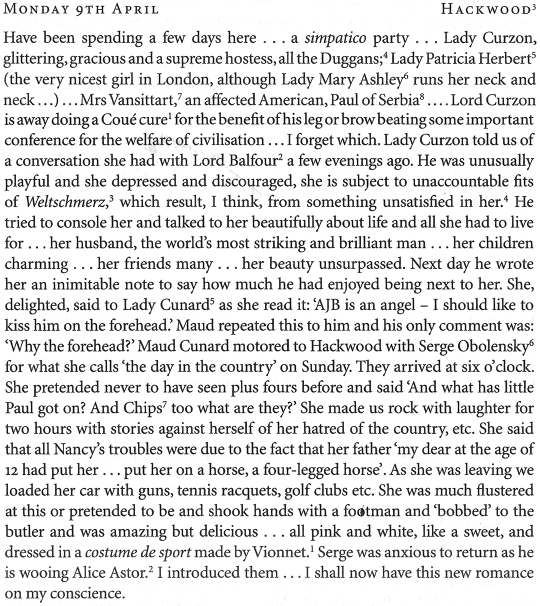
Henry ‘Chips’ Channon: The Diaries (Vol. 1), 1918-38, entry for 9th April 1923
—
Monday 9th April — Hackwood¹
Have been spending a few days here … a simpatico party … Lady Curzon, glittering, gracious and a supreme hostess, all the Duggans;² Lady Patricia Herbert³ (the very nicest girl in London, although Lady Mary Ashley⁴ runs her neck and neck …) … Mrs Vansittart,⁵ an affected American, Paul of Serbia⁶ …. Lord Curzon is away doing a Coué cure⁷ for the benefit of his leg or brow beating some important conference for the welfare of civilisation … I forget which. Lady Curzon told us of a conversation she had with Lord Balfour⁸ a few evenings ago. He was unusually playful and she depressed and discouraged, she is subject to unaccountable fits of Weltschmerz,⁹ which result, I think, from something unsatisfied in her.¹⁰ He tried to console her and talked to her beautifully about life and all she had to live for … her husband, the world’s most striking and brilliant man … her children charming … her friends many … her beauty unsurpassed. Next day he wrote her an inimitable note to say how much he had enjoyed being next to her. She, delighted, said to Lady Cunard¹¹ as she read it: ‘AJB is an angel — I should like to kiss him on the forehead’. Maud repeated this to him and his only comment was: ‘Why the forehead?’ Maud Cunard motored to Hackwood with Serge Obolensky¹² for what she calls ‘the day in the country’ on Sunday. They arrived at six o’clock. She pretended never to have seen plus fours before and said ‘And what has little Paul got on? And Chips¹³ too what are they?’ She made us rock with laughter for two hours with stories about herself and her hatred of the country, etc. She said that all Nancy’s troubles were due to the fact that her father ‘my dear at the age of 12 had put her … put her on a horse, a four-legged horse’. As she was leaving we loaded her car with guns, tennis racquets, golf clubs, etc. She was much flustered at this or pretended to be and shook hands with a footman and ‘bobbed’ to the butler and was amazing but delicious … all pink and white, like a sweet, and dressed in a costume de sport made by Vionnet.¹⁴ Serge was anxious to return as he is wooing Alice Astor.¹⁵ I introduced them … I shall now have this new romance on my conscience.
—
1. Hackwood Park, near Basingstoke in Hampshire, rented by Lord Curzon from 1906 until 1925.
2. Lady Curzon’s children by her first marriage: Alfred Duggan (1903–64), who became a minor novelist; Hubert Duggan (1904–43), Tory MP for Acton from 1931 to 1943 and anti-appeaser in the 1930s; and (Grace) Marcella Duggan (1907–95).
3. Patricia Herbert (1904–94), by courtesy Lady Patricia Herbert from 1913, daughter of the 15th Earl of Pembroke and 12th Earl of Montgomery, married in 1928 William Henry Smith, 3rd Viscount Hambleden (1903–48). She was a Lady of the Bedchamber to Queen Elizabeth from 1937 until 1994.
4. Lady Mary Sibell Ashley-Cooper (1902–36), daughter of the 9th Earl of Shaftesbury, married in 1928 Napier George Henry Sturt (1896–1940), who in 1919 succeeded his father as 3rd Baron Alington of Crichel. He died on active service in Egypt during the Second World War, though of drink rather than in action.
5. Gladys Robinson-Duff (1892–1928), daughter of General William C. Heppenheimer of the United States, married in 1921 Robert Gilbert Vansittart (1881–1957), who would be Permanent Under-Secretary at the Foreign Office from 1930 to 1938, and who would be raised to the peerage in 1941 as 1st Baron Vansittart. Vansittart was also an accomplished novelist, playwright and poet.
6. Prince Paul of Yugoslavia (1893–1976) had known Channon at Oxford and would remain one of his closest friends, and be Prince Regent of Yugoslavia (the Kingdom of the Serbs, Croats and Slovenes) from 1934 to 1941 during the minority of Peter II. He was the nephew of King Peter I and married Princess Olga of Greece and Denmark (1903–97), sister-in-law of Channon’s other closest friend, the Duke of Kent. After treating with the Germans in 1941 Paul was forced from Yugoslavia and forbidden ever to return; the post-war communist regime stripped him of his property and proclaimed him an enemy of the state. Until 1945 the British authorities held him in Kenya under house arrest. Serbia rehabilitated him posthumously in 2011, after which he was reburied with Princess Olga and their son Nicholas.
7. A psychotherapy-based cure featuring auto-suggestion, fashionable but heavily criticised at the time, developed by Émile Coué de la Châtaigneraie (1857–1926), a French psychologist.
8. A. J. Balfour, raised to an earldom in 1922.
9. World-weariness.
10. Curzon was desperate for a male heir (he had three daughters from his first marriage) to the earldom and marquessate he had obtained; various medical procedures had been followed to help Lady Curzon conceive, but no child resulted and the marriage was strained accordingly.
11. Maud Alice Burke (1872–1948), born in San Francisco, married in 1895 Sir Bache Cunard, 3rd Bt (1851–1925), grandson of the shipping line’s founder. They had lived largely apart since 1911, Cunard basing himself in Leicestershire where he enjoyed field sports. In London with their daughter Nancy Clara (1896–1965), Lady Cunard – who after her husband’s death became known as ‘Emerald’ – established one of the leading salons of the era, which thrived until the Second World War. After separating from her husband she became the mistress of Sir Thomas Beecham, the conductor, and funded many of his musical projects.
12. Prince Sergei (‘Serge’) Platonovich Obolensky Neledinsky-Meletsky (1890–1978) had been educated at Oxford and became part of the Russian diaspora after the revolution. He emigrated to America and became a successful businessman.
13. The first time in the diaries that he refers to his nickname.
14. Madeleine Vionnet (1876–1975) was one of Paris’s leading fashion designers of the interwar years.
15. Ava Alice Muriel Astor (1902–56), daughter of John Jacob Astor IV. She and Obolensky married in 1924 and divorced in 1932. She would marry four times before her death at the age of 54.
#chips channon#channon diaries#1923#1920s#grace curzon#alfred duggan#hubert duggan#marcella rice#patricia hambleden#mary alington#gladys vansittart#prince paul of yugoslavia#george curzon#arthur balfour#emerald cunard#prince serge obolensky#nancy cunard#madeleine vionnet#alice astor#hackwood park
7 notes
·
View notes
Text
OLGA ROMANOV AND PAVEL VORONOV
1913 was the Tercentennial of the Romanov family’s dynastic rule, and the eldest Grand Duchess Olga Romanov was coming of age (she turned 18 in early November). The Grand Duchess’s life was full of romance, pageantry and fun. One of her two love interests during that year was a young handsome officer from the imperial yacht: Pavel Alekseyevich Voronov.
In her diary entries Olga seemed incredibly happy to spend time with him, but by the end of the year she faced heartbreak: Pavel got engaged to another Olga – a Romanov family friend Olga Kleinmichel. The Grand Duchess only dares write about it in her diary in a special code she had devised. Below are Olga’s numerous diary entries about Pavel, whom she later called “S.” [for “Sunshine”?], along with their photographs together.
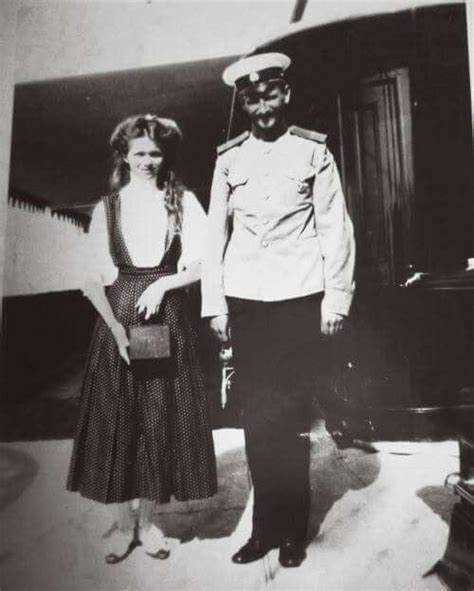
Diaries
“Monday. 10 June… Did not do anything special, walked around the deck, sat in the cabin with Pavl. Al. … After tea played with Pavl. Al. and [other] friends….. Balalaikas were playing during dinner. After that [I] held watch with Pavl. Al. on deck… ”
“Thursday. 20 June… There were boating exercises. Papa kayaked. Cutter-gig escort (Pavl. Al.)…. After dinner T and I went to the control room. Dear Pavl. Al. was writing in the log journal. We sat together until 10 o’cl. … ”
“Friday. 21 June… [I] read and then sat on the afterdeck with Pavl. Al. for a long while. It was so nice… After tea I read on deck with T. Pavl. Al. came at 7 o’cl, and we sat together until 7 1/2. .. It was very funny to watch A talk to Pavl. Al. through the half port on afterdeck. Until 11 ½ [we] sat there with him… ”
"Saturday. 29 June… [We] went ashore at 2 o’cl. 15 min. as usual. Played 7 sets with Pavl. Al. Won only 1 set, because T and Rodionov played well, but I stank… Vsenoshnaya was held on afterdeck… Dear Pavl. Al. is on watch duty, it was so nice. Papa played kosti. I stared at Pavl. Al. from the half-port. Beautiful evening.”
“Friday. 12 July. Peterhof… Pavl. Al. was on watch duty from 8 o’clock… [I] sat in the control room with Pavl. Al., the sisters, Ippolit and Rodionov until our arrival in Kronshtadt at 3 o’cl. It was awfully sad. I stood with him the entire time the gangway was extended. [We] left the yacht at about 4 o’clock. [It] was so awfully hard to part with the beloved Standart, the officers and the beloved [Pavel? – last word is crossed out, probably by Olga]. May the Lord keep him… So sad to be without them… ”
“Thursday. 12 December… We played dobchinsky-bobchinsky and ‘suitcase’ with T., Zborovsky and S. [Voronov was now “S.”. Written in code : “I love him terribly much, and it was so hard, I was angry and almost did not speak to him”]… ”
“Wednesday. 18 December… Lonesome without all the friends, the yacht, and of course S. … “
“Tsarskoe Selo. Thursday. 19 December… I am not as lonesome but still want to see S. at times.”
“Friday. 20 December… My S. arrived today. May the Lord save him and help him.”
“Saturday. 21 December… I found out that S. [Written in code: “My S. is marrying Olga Kleinmichel. May the Lord send him happiness, to my beloved S. So hard. So sad. May he be happy”].”

When she wanted to write something private, Olga used a special code she devised – this is an example of this code in her diary. She used this code most often at the end of 1913, when she learned that Pavel Voronov (her “beloved S.”) got engaged to be married to Olga Kleinmichel.
11 notes
·
View notes
Text

The last known photograph of Alexandra Feodorovna.
"The real Tsaritsa, firm in her convictions, the devoted wife, mother and friend, is unknown. Her acts of charity have been misconstrued, her religion has been made her shame, the very nationality which she so willingly relinquished has become an unmerited reproach. She knew and read all the reports concerning her, but, although anonymous letters sought to vilify her, and journalism bespattered her with filth, nothing touched her serenity of soul.
"I have seen her grow pale, and I have watched her eyes slowly fill with tears when something exceptionally vile came under her notice. But Alexandra Feodrovna was able to see the stars shining far above the mud of the streets."
– Lili Dehn
#history#imperial russia#romanovs#historical photos#olga nikolaevna#tatiana nikolaevna#alexandra feodorovna#alix of hesse#1918#1910s#lili dehn#letters/diary entries/quotes#memoirs#romanov#romanov family#romanov informals
32 notes
·
View notes
Text
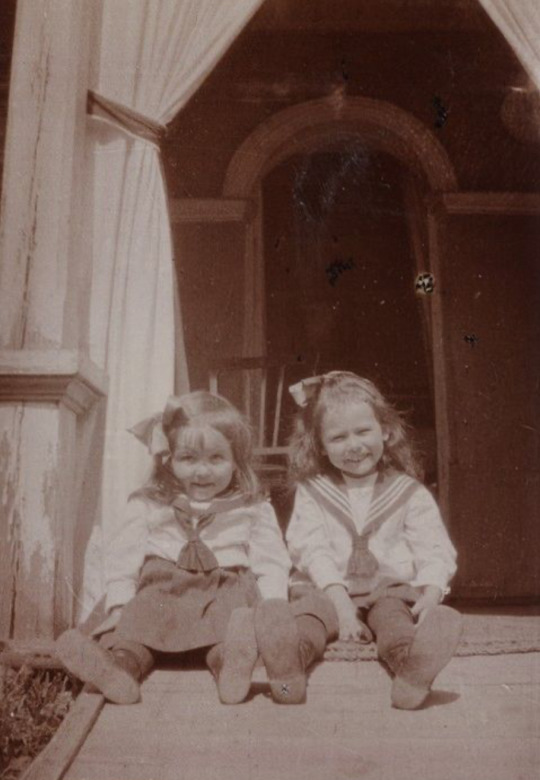

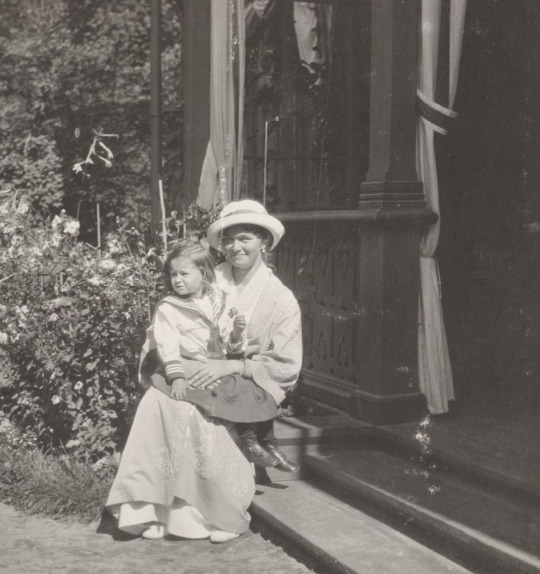
Anna Vyrubova’s nieces (children of sister Alya Vyrubova), Tatiana “Tanichka”, Olga, and Alexandra + Olga with Tanichka(?)
“Then we went to Anya's where we bathed and put to bed her three nieces, Alya’s daughters. Tatiana (the eldest, my goddaughter), Olga and Alexandra.”
— Diary entry of Grand Duchess Tatiana Nikolaevna, 24th July 1914
(ps. I’m not sure if the third photo is of Tanichka because I saw it labeled as a “small friend” but it looks like Tanichka so pls comment what you think and feel free to correct me!)
#olga nikolaevna#tatiana nikolaevna#otma#anna vyrubova#Alya Vyrubova#tanichka#tatiana#olga#alexandra#1914#letters and diaries#romanov
48 notes
·
View notes
Text
Olga Nikolaevna’s diary, 22nd January/4th February 1913
“Had lessons. 3 degrees below. At 10 o’cl. Otetz Alexander came over and gave Mama communion. She is feeling better, thank God. Had breakfast with her and Trina. Papa went to the consecration of the new barracks of the 4th Rifle Regiment’s 2nd Battalion and had breakfast there. In the afternoon we 4 walked with him. There was more snow. Exercises at 4 o’cl. as usual. Uncle Pavel had tea with Papa and Mama. [We] had a dance lesson. Had dinner with Papa, Mama and Veselkin. Kaisorsky was telling funny stories. In the afternoon Lili Dehn and Titi came to [see] Mama. So sweet.”
4 notes
·
View notes
Note
hi I really love your legacy challenge! I was just wondering whether you think the family has retained spanish speaking? obviously you write the posts in english because you know english, but are they supposed to be in spanish ingame? or are the diary entries/dialog english because that's what the characters speak
Thanks for the question! I think that up until Olga and J’s generation, the Marquezes speak Spanish at home and in their journals, but have also learned English at school. In Olga’s children’s case, since their father is English-speaking only, they mostly speak and write in English but have learned Spanish from their mother. (Luisa, Oscar, Consuelo, and Ramon are all bilingual.)
8 notes
·
View notes
Note
I've read every single book I can find on the Romanovs but would like some help finding more books. I just found your blog and I love it!
Hello, thanks for your question. Here are some of my favourite more obscure books for those of you who have read all you can find and raided the libraries!
The Romanovs Under House Arrest: From the 1917 Diary of a Palace Priest edited by Marilyn Pfeifer Swezey
A short, but interesting and beautifully illustrated book that translated the diaries of Archpriest Afanasy Belyaev into English. It gives an insightful look into the last few months and weeks the Romanovs spent at the Alexander Palace and their faith.
LUNCH ON THE BALCONY: Recipes from the table of Russia’s last imperial family by Helen Azar
Can you tell I'm hungry right now? This book has some nice information about the Romanov's food, showing menus they used, letters and diary entries referencing food, and recipes used in the imperial kitchen that you can try at home.
Last Years of the Court at Tsarskoe Selo Volumes I and II by Count Alexander Spiridovich, edited and translated by Katherine Alexandra Hines
A lengthy look at the Count's role as a member of court and security duties. These volumes have some interesting passages about OTMA, though they focus more on the political activities of the Romanovs.
The Forgotten Tutor: John Epps and the Romanovs by John Epps and Dr. Gabriella Land
John Epps, an English tutor to the imperial children, remains a somewhat elusive figure in literature about the Romanovs, with very little information available about him in comparison to fellow tutors Gilliard and Gibbes. I have personally found it very difficult trying to track down this book as it was published a decade ago and seems to have only had one limited print run. The extracts that I have read have been very interesting. If you're interested in OTMA's childhood and education, this book is perfect for you - but good luck finding it! :(
A Few Years Before the Catastrophe: The memoirs of Sofia Ivanovna Tyutcheva edited and translated by George Hawkins
A very short but interesting read directly from the recollections of Sofia Ivanovna Tyutcheva who looked after the children. It gives a short but enlightening look at how things were run in the nursery.
When Miss Emmie Was in Russia: English Governesses Before, During and After the October Revolution by Harvey Pitcher
This book has a more sweeping view of Russian nannies in general, but has some nice tidbits of information about OTMA's nannies, such as Margaret Eagar (though she was Irish, not English!). If you enjoyed Charlotte Zeepvat's book on royal nannies that has some great info and sources on OTMA, this is a good follow up read.
Step-daughter of Imperial Russia by Natalia Mamontova Majolier
Recollections from Natalia "Tata", Grand Duke Mikhail Alexandrovich's beloved stepdaughter. Lots of information about growing up with Mikhail and experiencing the Revolution.
Russia, My Native Land: A U.S. Engineer Reminisces and Looks at the Present by Gregory Tschebotarioff (Chebotaryov)
Written by the son of Grand Duchess Olga and Tatiana Nikolaevna's fellow nurse and friend, Valentina Ivanovna Chebotaryova, this memoir gives a greater picture of Valentina's life by including extracts of her diary. It also has details about Gregory's experience serving in WWI.
Anastasia's Sisters: Their Diaries, Letters and Memories edited by Raegan Baker and translated by Catherine Hamel
A short book with extracts from Grand Duchesses Olga, Tatiana, and Maria's writings. I always find it interesting to read different translations of the same sources and find various changes made my each translator. As always, translations rely on the translator's discretion and interpretations.
The Many Deaths of Tsar Nicholas II by Wendy Slater
This book is an academic, somewhat cold and clinical, look at the deaths of the Romanov family. The compilation of scientific analysis (though this was published in 2007, so not accurate to recent discoveries) during the middle sections is the best part of this book, as the fictionalised narrative at the start doesn't appeal to me and the analysis during the latter stages veers off focus.
The Jewel Album of Tsar Nicholas II and a Collection of Private Photographs of the Russian Imperial Family by Alexander von Solodkoff
A lovely illustrated book - if you can afford it!! This regularly sells for over $100, but is very detailed and beautiful, including high-quality full-colour copies of Nicholas' "Jewel Album" with his annotations and marvellous drawings.
My Father by Maria Rasputina
For fans of the infamous Rasputin, this glimpse into how daughter Maria perceived her father is an interesting read. Rasputin is one of the most contentious and well-researched figures in this area of history, and reading his daughter's experiences and how she viewed his healing of Tsarevich Alexei is a unique viewpoint.
The Emperor Nicholas II: As I Knew Him by John Hanbury-Williams
Major-General Sir John Hanbury-Williams provides an intimate look at life during WWI in Russia, from the perspective of his role as an English representative at Stavka. Some interesting observations about Nicholas and Alexei.
Lost Tales: Stories for the Tsar's Children by Gleb Botkin
Gleb Botkin, only seventeen, composed and illustrated this series of tales (collected here as one book) for the imperial children during their imprisonment at Tobolsk. A lovely look into Gleb's artistic skills, and the interesting parallels between his animal characters and the revolution. Not necessarily a history book, but an interesting insight into life at Tobolsk.
In case I missed any, if you search #q and #answered on my blog it will come up with a list of previous questions, a lot of which relate to reading recommendations, so you might find some more suggestions there.
For information of a compilation of primary source writings written by the Romanovs that have been translated into English, see here
Happy reading!
23 notes
·
View notes
Text
Published in association with the UNHCR, the UN Refugee Agency, with a foreword by Michael Morpurgo.
Everyone knows the word 'war'. But very few understand what it truly means. When you find you have to face it, you feel totally lost, walled in by fright and despair. Until you've been there, you don't know what war is.
'Everyone, absolutely everyone, should read it. You will love Yeva.' Christy Lefteri, No.1 international bestselling author of The Beekeeper of Aleppo
This is the gripping and moving diary of young Ukrainian refugee Yeva Skalietska. It follows twelve days in Ukraine that changed 12-year-old Yeva's life forever. She was woken in the early hours to the terrifying sounds of shelling. Russia had invaded Ukraine, and her beloved Kharkiv home was no longer the safe haven it should have been. It was while she was forced to seek shelter in a damp, cramped basement that Yeva decided to write down her story. And it is a story the world needs to hear.
Yeva captured the nation's heart when she was featured on Channel 4 News with her granny as they fled Ukraine for Dublin. In You Don't Know What War Is, Yeva records what is happening hour-by-hour as she seeks safety and travels from Kharkiv to Dublin. Each eye-opening diary entry is supplemented by personal photographs, excerpts of messages between Yeva and her friends and daily headlines from around the world, while three beautifully detailed maps (by Kharkiv-native Olga Shtonda) help the reader track Yeva and her granny's journey. You Don't Know What War Is is a powerful insight into what conflict is like through the eyes of a child and an essential read for adults and older children alike.
5 notes
·
View notes